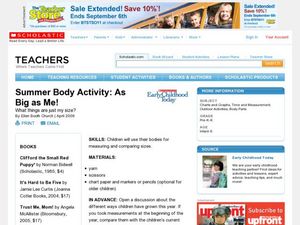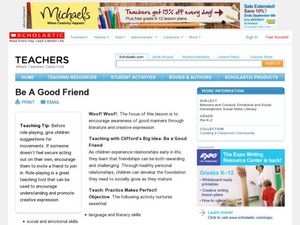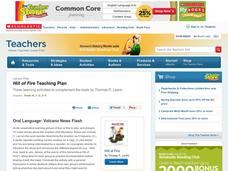Curated OER
Create a Graph Online
Scholars create colorful bar, line, or pie graphs. They decide on a survey question to ask or a type of data to gather. From there, they collect information and data. They display this data in bar, line, or pie graphs that they create...
Curated OER
Graphing Difference
Students use problem solving skills to reason, predict and problem solve through exploration. They recognize a way in which they are different from their peers and create a graph that shows these differences.
August House
Why Koala Has a Stumpy Tail
Learn about the animals of Australia with a language arts lesson about an Australian folktale called, Why Koala Has a Stumpy Tail. After reading the story as a class, kids discuss events and characters from the book, retell the...
Curated OER
Literacy Activity: The Perfect Pet
Learners develop their listening skills as they listen to the book The Perfect Pet. In this reading instructional activity, students listen to the book, and then talk about the pets they have. Then they make a graph as a class of all...
Curated OER
Activity Plan 4-5: I'm Graphing to Know You!
Learners create graphs about themselves to learn more about one another. In this early childhood math lesson, students record information about one another as they make picture graphs.
Curated OER
A Reading Graph
Students construct and interpret a "favorite classroom books" graph. In this literacy and math graphing lesson, students choose a reduced size copy of the book cover that corresponds with the book(s) they chose to read during their...
Curated OER
Making Graphs
Students explore statistics by conducting class demographic surveys. In this graph making instructional activity, students identify the family members of each classmate, pets they own, and favorite activities. Students organize their...
Lied Center of Kansas
The Ugly Duckling and The Tortoise and the Hare
Both The Ugly Duckling and The Tortoise and the Hare are great additions to an elementary language arts lesson. Young readers focus on the literary elements of each story, including characters and plot development, and apply...
Curated OER
Creating Bar Graphs
Students create bar graphs based on the names in their family. In this bar graphs lesson, students collect the names of the their family members, graph the names into a graphing computer program, and compare the data with their classmates.
Curated OER
Summer Body Activity: As Big as Me!
Young scholars explore things that are their size, literally. In this early childhood lesson plan, students use their bodies for measuring and comparing sizes as they work in pairs to complete the activity.
Curated OER
Tracking Olympic Gold!
Students use print or online resources to track the results of the Olympic Games, record daily results on graphs, use graphs to collect information.
Curated OER
Be a Good Friend
Students discover characteristics of a good friend. In this social skills lesson, students read Clifford's Manners and discuss ways Clifford used his manners in the story. An activity that rewards students for modeling being courteous...
Curated OER
A Planet Full of Animals
Students study animals and practice classifying them through observation activities. In this animal classification lesson plan, students complete a KWL chart about animals. Students then sort pictures of animals into chart categories...
Curated OER
Studying Soils on South Penquite Farm
Learners investigate soil depth. In this studying soils lesson, students visit South Penquite Farm and collect samples. Learners record their data and graph results.
Curated OER
How Many Letters Are In Your Name?
Young scholars discover how to make a graph that represents the number of letters in their names. In this early childhood math lesson plan, students collect data, categorize data, and develop skills to analyze the pieces of data.
Scholastic
Hill of Fire Teaching Plan
Some books are perfect for drawing connections between multiple subjects. The book Hill of Fire becomes the hub for three very different, yet related activity ideas. First the class hones their oral language skills by creating an...
Pennsylvania Department of Education
Eye to Eye
Learners practice the concept of posing mathematical questions regarding themselves and their surroundings. In this eye to eye lesson, students gather data about eye color from their classmates. Learners organize their data in order to...
Curated OER
Cereal Box Blocks and More!
Young scholars sort and categorize different types of boxes and cartons. In this sorting lesson, students designate areas of the room to put different sizes, styles, or colors of boxes. They help their teacher count and graph the...
Curated OER
Pumpkin Pumpkin
Students study the very basics of pumpkins. By looking at where pumpkins grow, what they grow on, and what can be done with a pumpkin. They create a graphic organizer and then carve a pumpkin for Halloween.
Curated OER
Getting to Know You
Students read a book about understanding differences. In this getting to know you lesson, students sit in a circle, roll a ball to each other and tell one thing about themselves when they get the ball. Students read the book...
Curated OER
On the Seashore
Students read the book On the Seashore and complete activities such as reading a book, color and cut out animal cards, model rock making, shell graphing, shell patterns, and more. In this seashell lesson plan, students use the sea...
Curated OER
Getting to Know You
Students converse with each other while playing a game in order to discover things that are alike and things that are different about themselves. The students gather data about themselves, organize and display data on the graph, and...
Curated OER
Activity Plan 3-4: Scrumptious Shapes
Students discover together that shapes are everywhere - even in the food we eat. In this early childhood math and art lesson, students read about shapes, identify foods that match geometric shapes, and create a class book.
Curated OER
Stuffed Animals Measuring
Students measure stuffed animals with various materials such as dog biscuits, paper clips, and yarn. In this measurement lesson, students measure the stuffed animals, and understand the concept of long and short and big and little.

























